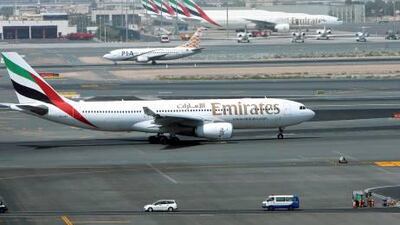Boeing, the world's largest aircraft maker, has come to the defence of Gulf airlines, saying European carriers have "overdramatised" the issue of export credits.
Western airlines have called for their governments to limit the amount of financing available to their rivals in the Middle East after a deep recession for the global airline industry.
"I think the whole US Ex-Im [Export-Import] Bank issue has been overdramatised by some of the carriers," Marty Bentrott, the regional vice president of sales at Boeing, said during a visit to Dubai yesterday.
"I really don't think that [export credits] are providing any kind of substantial competitive advantage to anybody. If airlines have good businesses, good balance sheets, they will have good credit and their accessibility to lower cost financing will be there."
A group of two dozen US and European airlines have petitioned their governments to amend the system of export-credit financing, which is not available to airlines in the home markets of Airbus and Boeing.
The carriers have asked the agencies, including the UK's Export Credits Guarantee Department, Coface of France, and the US Export-Import Bank, to limit the amount of insurance they provide to loans on Airbus and Boeing aircraft to their rivals in the Middle East and Asia.
The group has often cited two aircraft financing deals for Delta and Emirates Airline for Boeing 777 aircraft, in which Delta's loans were 4.5 percentage points higher than those arranged by Emirates.
Mr Bentrott called the example "a little overblown", explaining each airline had a very different business outlook at the time of financing.
"[Boeing] provided some very clear information around both of these circumstances that would suggest that Delta has not been competitively disadvantaged," he said.
"There were probably some circumstances around [Delta's] business at the time, and the rates in the marketplace, that ended up causing them to have to pay more."
Diogenis Papiomytis, of the consultancy Frost & Sullivan, said European governments must consider the needs of their airlines with that of the aerospace manufacturing industry, which depends on orders from Gulf airlines.
"It seems to be that what is good for European aerospace is not as good for Europe's airline industry," Mr Papiomytis said. "That is just a fact of life."
The campaign comes amid separate efforts from some European airlines such as Air France to lobby their governments against further UAE flights into Europe.
The country's ambitions to become a global aviation hub have pitched it into a multi-front battle to encourage governments such as Canada and Germany to allow its airlines greater access.
Protectionist policies in the global airline industry are not new. Since the start of the modern aviation era after the Second World War many governments have blocked access from foreign airlines to support flag carriers.
But that is easing as the commercial benefits of wider access are recognised.
"There will always be a degree of protectionism in certain places," said Mr Bentrott. "But I would say we've seen a lot more movement towards an 'open skies' environment."

